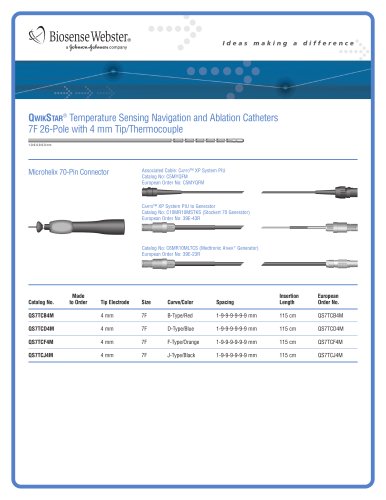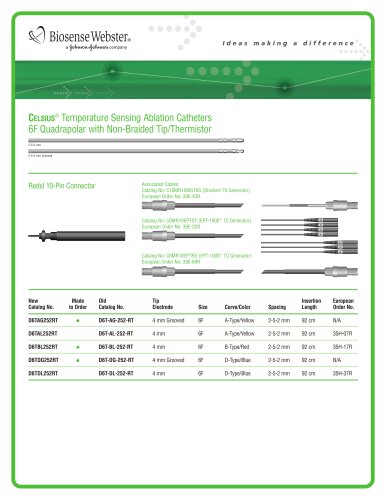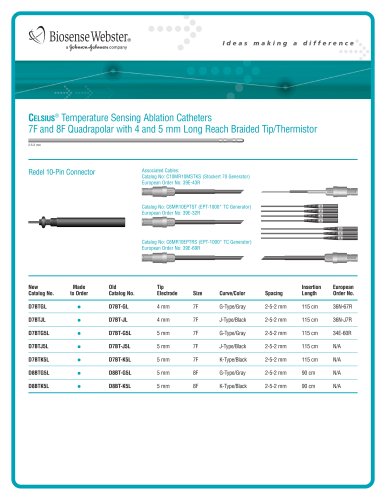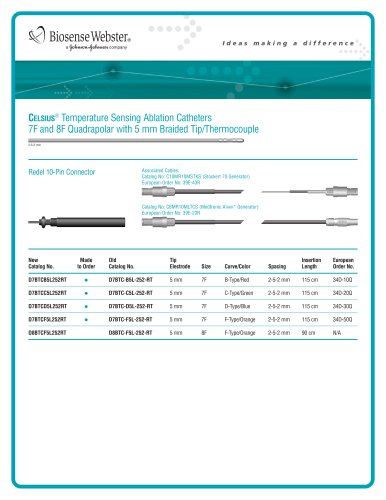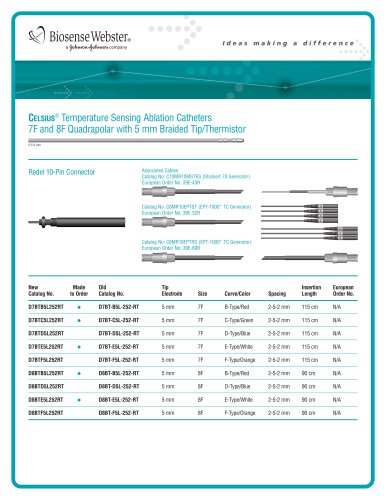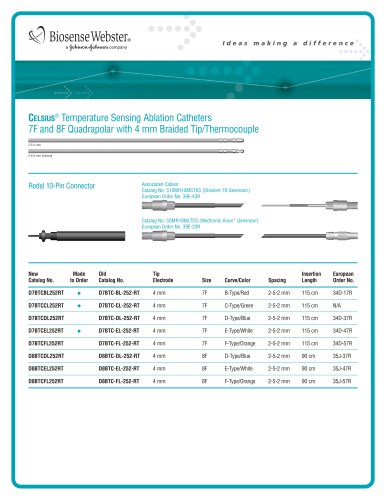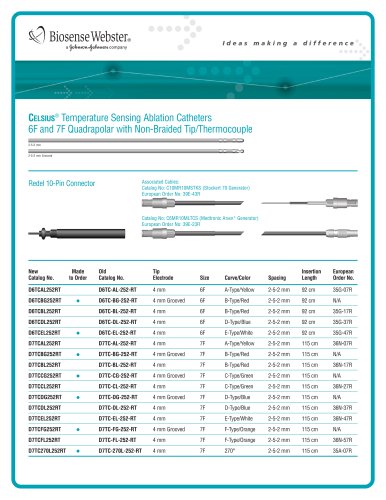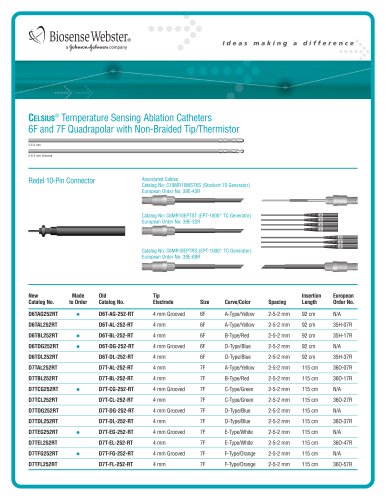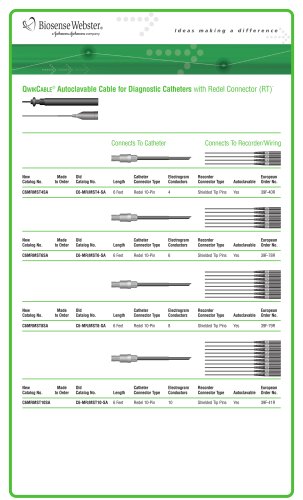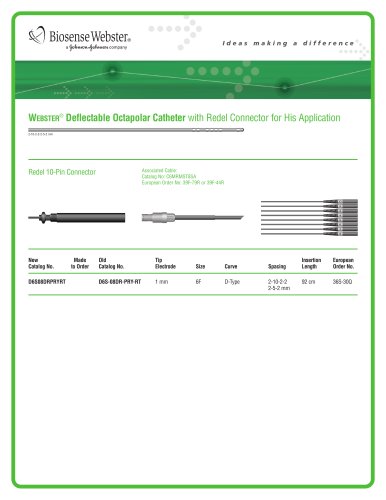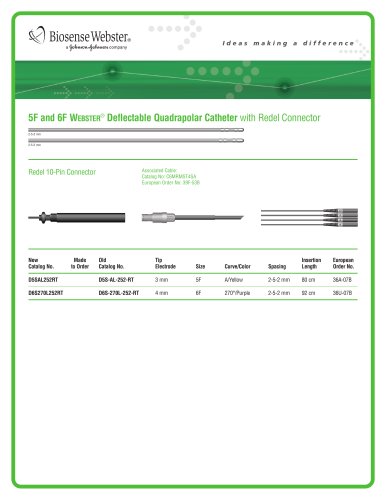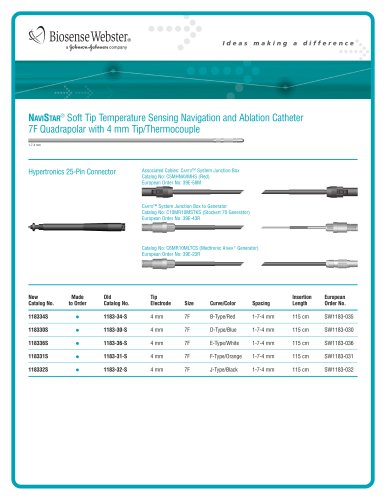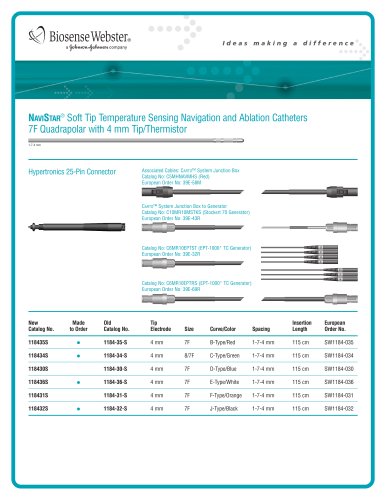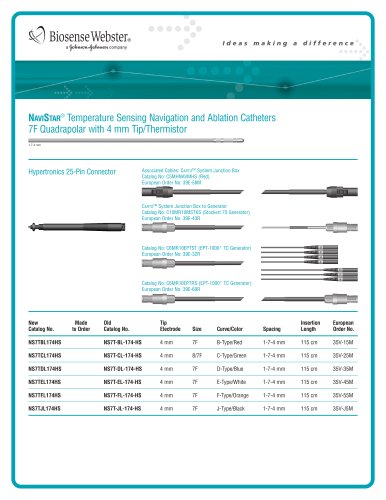
Excertos do catálogo

V) Biosense Webster. PART OF THE ^dl4M01t«^ofc«MOM FAMILY OF COMPANIES The Carto® 3 System is an advanced imaging technology that utilizes electromagnetic technology to create real-time three-dimensional (3D) maps of a patient’s cardiac structures. The system is designed to help electrophysiologists navigate the heart by generating an accurate 3D map, as well as pinpointing the exact location and orientation of catheters in the heart during diagnostic and therapeutic procedures for patients suffering from heart rhythm conditions (cardiac arrhythmias). The Carto® 3 System acts very much like an advanced navigation system in a car that guides the driver with visual and audio cues to ensure safe parking and operation of the vehicle. During a therapeutic catheter ablation procedure, doctors insert a catheter through a small incision in the groin where it is then weaved up to the heart through a blood vessel in the leg. Once it reaches the heart, radiofrequency energy is delivered to specific areas of the heart wall to produce a small lesion, or scar, to block faulty electrical impulses that can cause heart rhythm disorders. The 3D image that’s generated by the system helps doctors steer the catheter to areas in the heart where RF energy needs to be administered. Carto® 3 System Features • The Carto® 3 System enables accurate visualization of multiple catheters in a patient’s heart and pinpoints the exact location and orientation of a catheter • Fast anatomical mapping (FAM) technology allows clinicians to rapidly create a map of the heart with CT like resolution, which minimizes the need for fluoroscopy radiation during catheter ablation procedures1 • Advanced technology compensates for patient and cardiac motion to ensure accurate, real-time visualization of the cardiac structures • The computer-like system is capable of running software modules that introduce additional advanced features and continued innovations in the field of electrophysiology
Abrir o catálogo na página 1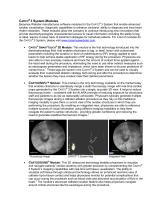
CARTO® 3 System Modules Biosense Webster manufactures software modules for the CARTO® 3 System that enable advanced cardiac visualization, diagnostic capabilities to enhance clinicians’ ability to diagnose and treat heart rhythm disorders. These modules allow the company to continue introducing new innovations that provide electrophysiologists unprecedented access to visual information including the ability to tag, or label, lesions to keep track of treatment strategies for individual patients. For a list of modules for the CARTO® 3 System, please visit www.biosensewebster.com. CARTO®...
Abrir o catálogo na página 2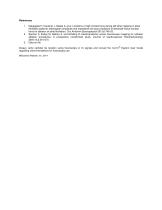
Nakagawa H, Kautzner J, Natale A, et al. Locations of high contact force during left atrial mapping in atrial fibrillation patients: electrogram amplitude and impedance are poor predictors of electrode-tissue contact force for ablation of atrial fibrillation. Circ Arrhythm Electrophysiol 2013;6:746-53. Sporton S, Earley M, Nathan A, and Schilling R, Electroanatomic versus fluoroscopic mapping for catheter ablation procedures: A prospective randomized study. Journal of Cardiovascular Electrophysiology 2004;15,3:310-315. Data on file. ® Always verify catheter tip location using fluoroscopy or...
Abrir o catálogo na página 3Todos os catálogos e folhetos técnicos Biosense Webster
-
PentaRay nav
2 Páginas
-
CATALOGUE 2018
130 Páginas
-
Ep procedure Documentation
2 Páginas
-
Atrial Fibrillation Fact Sheet
3 Páginas
-
THERMOCOOL® SMARTTOUCH® Catheter
2 Páginas
-
C ARTO ® 3 System
3 Páginas
-
AcuvNav? Catheter
4 Páginas
-
AcuNav? Ultrasound Catheter
4 Páginas
-
Preface® Braided Guiding Sheaths
2 Páginas
-
Webster® HIS Catheter
2 Páginas
-
Webster® CS Uni-Directional Catheter
2 Páginas
-
DecaNav? Catheter
3 Páginas
-
PentaRay® NAV Catheter
6 Páginas
-
Lasso® NAV Eco Catheter
6 Páginas
-
ThermoCool® Catheters
4 Páginas
-
SFOrderCard
2 Páginas
-
ThermoCool ®
2 Páginas
-
Nakagawa
6 Páginas
-
Carto® System Insight Magnified
6 Páginas
-
PREFACE Braided Guiding Sheaths
1 Páginas
-
COOLFLOW Pump
1 Páginas
-
Tip Electrode Types
1 Páginas
-
Fixed Curves
6 Páginas
-
PENTARAY
1 Páginas
-
WEBSTER 6F Fixed Curve Catheter
1 Páginas
-
WEBSTER 6F Hexapolar Catheter
8 Páginas
-
WEBSTER 6F Quadrapolar Catheter
8 Páginas
-
WEBSTER 5F Quadrapolar Catheter
8 Páginas
-
WEBSTER Decapolar Catheter
1 Páginas
-
WEBSTER Octapolar Catheter
1 Páginas
-
WEBSTER 7F Hexapolar Catheter
1 Páginas
-
HALO XP
1 Páginas
-
ACUNAV brochure
4 Páginas
-
CARTO XP System specifications
4 Páginas
-
CARTO XP EP Navigation System
2 Páginas
-
CARTO RMT
4 Páginas
-
EZ STEER
6 Páginas
-
Stockert 70
1 Páginas
-
THERMOCOOL
6 Páginas
-
ACUNAV
4 Páginas
-
CARTO XP EP
4 Páginas
Catálogos arquivados
-
CATALOGUE 2015
140 Páginas
























